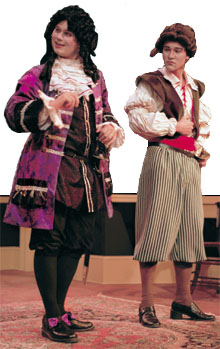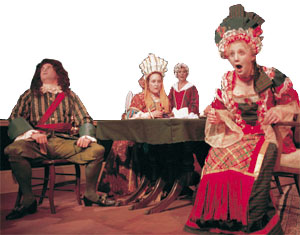

|

|

"It's About Sex!" Staging a forgotten play from the early 18th century By Kimberly Swick Slover Photos by Doug Prince See also: More than a decade ago, Julie Brinker, UNH's director of theater education, fell in love with the work of an early-18th-century British playwright named Susanna Centlivre. Admired in her own time for her witty plots, appealing characters and lively dialogue, Centlivre may have been the first woman author to make a living writing under her own name. But her plays later fell out of fashion, and Brinker doubts that any of them have been staged more than a few times since their author's death in 1706. Ever since she discovered Centlivre's plays, Brinker has wanted to produce one. "She was a good playwright," she explains. "I couldn't believe what great stories she was telling, and she had strong women characters, which we don't expect in plays of that time." But where can you find an audience that will appreciate a forgotten 300-year-old play? As it turned out, Brinker didn't have to find that audience, because it was assembled for her last December, when UNH hosted the annual conference of the Northeast American Society for Eighteenth-Century Studies. The four-day conference focusing on "Projects and Projectors: Inventions of the Enlightenment" attracted 300 18th-century scholars representing many fields in the humanities, arts and social sciences. For months before the conference, Brinker worked with a student cast and production crew to bring Centlivre's 1705 comedy The Bassett Table to life. The play's action swirls around the gaming table of the aristocratic and feisty Lady Reveller and the romantic intrigues of the players. (Bassett was a popular card game in the early 18th century.) The play is characteristic of literature of the late Restoration Period (1625 to 1700), which in contrast to the preceding Elizabethan and Puritan eras, emphasized simple, direct expression and bawdy realism, depicting men and women as they are, without romanticizing their characters. 
"The Bassett Table was a sequel to a successful play Centlivre had written called The Gamester, " Brinker says. "It wasn't my favorite of her scripts, but it was the best for college students to do. Most of the characters are young, and their interests aren't that different from those of young people today." The students struggled with the language of the play during auditions, but in acting out their parts in rehearsals, they began to understand what it was about. "As in Shakespeare, this play was made to be performed," explains Brinker. "The actors started saying, 'This is wonderful! It's all about sex!' They began to see that these characters laughed at the same things they do and had the same problems in terms of love and money." But why would students, mid-semester, agree to devote three to four hours a day, six times a week for six weeks to performing in a play? Continued on Page 2 blog comments powered by Disqus 9 Edgewood Road Durham NH 03824 (603) 862-2040 alumni@unh.edu |